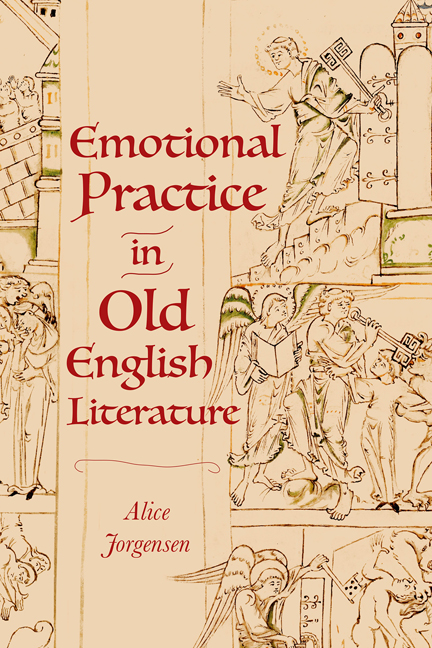Book contents
- Frontmatter
- Dedication
- Contents
- Acknowledgements
- Abbreviations
- Introduction: The Wanderer and Emotional Practice
- 1 Participating in a Heroic Emotional Style: Beowulf
- 2 Uses of the Heroic Style: The Battle of Brunanburh and The Battle of Maldon
- 3 Controlling and Converting Emotion: The Old English Boethius
- 4 Relating to the Divine in the Exeter Book: Christ I and Christ III
- 5 Performing Fear in Old English Homilies
- Conclusion
- Bibliography
- Index
- Miscellaneous Endmatter
Conclusion
Published online by Cambridge University Press: 09 May 2024
- Frontmatter
- Dedication
- Contents
- Acknowledgements
- Abbreviations
- Introduction: The Wanderer and Emotional Practice
- 1 Participating in a Heroic Emotional Style: Beowulf
- 2 Uses of the Heroic Style: The Battle of Brunanburh and The Battle of Maldon
- 3 Controlling and Converting Emotion: The Old English Boethius
- 4 Relating to the Divine in the Exeter Book: Christ I and Christ III
- 5 Performing Fear in Old English Homilies
- Conclusion
- Bibliography
- Index
- Miscellaneous Endmatter
Summary
THIS BOOK has offered case studies of emotional practice across a range of Old English texts, including heroic poems, philosophical prose translation, liturgical and meditative poetry, and homilies. At the least, it is hoped that it has provided useful readings of the individual texts and exemplified what can be revealed by paying attention to how Old English texts do various kinds of emotional work. These kinds of work include offering a way to participate in a heroic ethic of emotional control, celebrating victory and dealing with the blow of defeat, modelling the control of harmful passions, providing emotional stances that position Christians towards the wider community of the faithful and towards God, exploiting empathy to compel recognition of Christ's lordship and prompt compassion and charity towards others, and invoking, stimulating and displaying various shades of fear. This conclusion briefly looks across the chapters to draw out some threads that run through all of them, revisiting the major topics advertised in the introduction.
Control and relationship
A concern that runs through all the chapters in the book is the control of emotions. Emotions, especially sorrow, fear, anger and pride, have the capacity to be overwhelming, negative, socially destructive or spiritually dangerous. Rosenwein criticises a ‘hydraulic’ understanding of emotion as historically unhelpful: emotions are not pre-cultural urges and surges but arise and are experienced in culture-specific ways, and their history is not the history of how they have been controlled or ‘civilized’. (Rosenwein's metaphorical use of ‘hydraulic’ is to be distinguished from the ‘hydraulic model’ described by Lockett, according to which emotions literally seethe and heat up in the breast.) However, all the texts in this book work with the assumption that emotions can rise up unbidden and that it is appropriate to manage them.
The concepts underlying the texts do vary. The heroic literature, certainly informed by the ‘hydraulic model’ in Lockett's sense, and also by the idea that joy, sorrow or terror present in the surrounding world can pass into the container of the mind, can give a sense that emotions are a largely inevitable aspect of living in the world.
- Type
- Chapter
- Information
- Emotional Practice in Old English Literature , pp. 214 - 226Publisher: Boydell & BrewerPrint publication year: 2024



